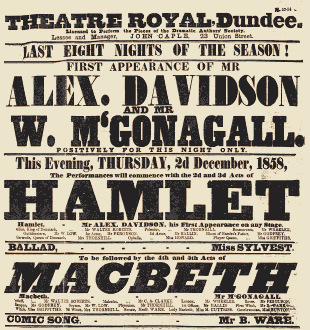McGonagall bears the unique distinction of meriting two seperate entries in Stephen Pile’s Book of Heroic Failures. These entries are reproduced below:
The Worst British Poet
With William Topaz McGonagall, we approach one of the giants in our field. He was so giftedly bad that he backed unwittingly into genius. Combining a minimal feel for the English language with a total lack of self-awareness and nil powers of observation, he became a poet.
Sitting in his back room in Paton’s Lane, Dundee, wishing he was on holiday, he was seized with a desire to write poetry. He paced the room, saying, “But I know nothing about poetry.” Thus qualified he sat down and penned his first great work.
An Address to the Rev George Gilfillan
All hail to the Rev George Gilfillan of Dundee,
He is the greatest preacher I did ever hear or see.
He is a man of genius bright,
And in him his congregation does delight,
Because they find him to be honest and plain,
Affable in temper, and seldom known to complain.
He preaches in a plain straightforward way,
The people flock to hear him night and day,
And hundreds from the doors are often turn’d away,
Because he is the greatest preacher of the present day.
He has written the life of Sir Walter Scott,
And while he lives he will never be forgot,
Nor when he is dead,
Because by his admirers it will be often read;
And fill their minds with wonder and delight,
And wile away the tedious hours on a cold winter’s night.
He has also written about the Bards of the Bible,
Which occupied nearly three years in which he was not idle,
Because when he sits down to write he does it with might and main,
And to get an interview with him it would be almost vain,
And in that he is always right,
For the Bible tells us whatever your hands findeth to do,
Do it with all your might.
Rev George Gilfillan of Dundee, I must conclude my muse,
And to write in praise of thee my pen does not refuse,
Nor does it give me pain to tell the world fearlessly, that when
You are dead they shall not look upon your like again.
On one famous occasion, he read this and other of his poems in a pub. “It was a great triumph. The publican told the waiter to throw a wet towel at me, which, of course, the waiter did and I received the wet towel, full force, in the face,” he wrote in his diary.
The Worst Macbeth
William McGonagall’s first stage appearance was as Macbeth at Mr Giles’s Theatre in Dundee. Realizing what a talent McGonagall had, Mr Giles said that he could only appear if a large sum of money was paid to the theatre in cash before the performance.
 McGonagall said he considered this “rather hard”, but his fellow workers at the Seafield Handloom Works in Dundee had a whip round. They had heard him reciting Shakespeare at work, in his own unique way, and were keen to see him turned loose amidst professional actors.
McGonagall said he considered this “rather hard”, but his fellow workers at the Seafield Handloom Works in Dundee had a whip round. They had heard him reciting Shakespeare at work, in his own unique way, and were keen to see him turned loose amidst professional actors.
“When the great night arrived,” McGonagall wrote in his diary, “my shopmates were in high glee with the hope of getting a Shakespearian treat from me. And I can assure you, without boasting, they were not disappointed.”
When he appeared on stage, he was received with a perfect storm of applause. When he uttered his first line – “So foul and fair a day I have not seen” – there was a deafening ovation.
The high spot came in the final scene, when Macduff is supposed to kill Macbeth in a sword fight. Unwisely, the actor playing Macduff told McGonagall to “cut it short”.
Suspecting that the actor was jealous of the acclaim he was receiving, McGonagall refused to die. A new ending to ‘Macbeth’ seemed imminent.
“I continued the combat until he was fairly exhausted, and there was one old gentleman in the audience cried out: “Well done, McGonagall! Walk into him!” And so I did until he (Macduff) was in great rage, and stamped his foot, and cried out “Fool! why don’t you fall?” And when I did fall, the cry was “McGonagall! McGonagall! Bring him out! Bring him out!” Until I had to come out and receive an ovation from the audience.”
© Stephen Pile, 1979.
All rights acknowledged
Books
- The Book of Heroic Failures – The original book from which the above excerpts are taken
- The Ultimate Book of Heroic Failures – Stephen Pile’s latest collection of epic underachievement

You’re so right, the man was a genius. To call him a “poet”, is to insult him. He occupied a niche in the realm of wordsmiths that was uniquely and peculiarly his own. Who can he be compared with? His works (for want of a better word) have been described as doggerel. But think of it, he managed, given all the resources of the English language, to produce versification so diametrically opposite to the canons of poetic expression as practised for a thousand years that they form a category all by themselves; unique and unassailable in their magnificent isolation.